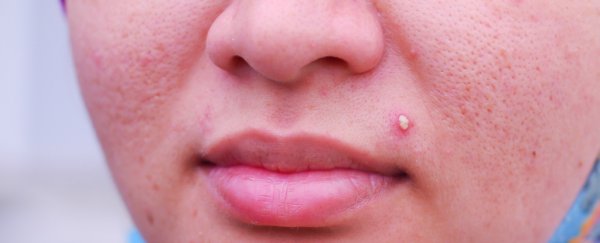Research over the past decade has definitively shown that mental disorders such as depression aren't just in our heads - they affect our entire bodies.
And now, for the first time, scientists have mapped out which physical disorders are linked to which mental disorders in teenagers - and the results suggest that depression, anxiety, and eating disorders all leave their own physical signature marks on the body.
A new study has found that digestive system diseases and arthritis are more common after depression, and teenagers who've suffered from anxiety are more likely to go on to have skin disorders.
Now, let's be clear - this study only shows a correlation between these disorders, and no one is saying for sure that these mental disorders cause these physical issues.
But the researchers have found a link between them, which is enough to suggest that there's some kind of relationship here that's worth investigating - particularly since one in five young people in the US experience mental health issues.
To figure this out, a team from the University of Basel in Switzerland and Ruhr University Bochum in Germany looked at data on 6,483 teenagers aged between 13 and 18 in the US.
After adjusting for factors such as lifestyle and sociodemographic variables, they were able to show:
- Teenagers who suffered from depression were more likely to go on to experience digestive problems and arthritis
- anxiety was commonly followed by skin diseases
- anxiety was more common if a teenager had already suffered from heart disease
- eating disorders were more common in teens that had already experienced epilepsy.
You can see which mental health disorders predict which physical disorders below:
The same team had already shown last year that there was a correlation between certain physical disorders and mental illnesses, but this is the first time they've been able to map that link along a time frame - in other words, they were able to show which disorders came first.
A better understanding of these relationships could help researchers to better treat teenagers in the future, and also predict their risk factor of going on to develop other conditions. And it provides insight into what could be causing the links between the disorders.
"For the first time, we have established that epilepsy is followed by an increased risk of eating disorders - a phenomenon that had previously been described only in single case reports," said lead researcher Marion Tegethoff from the University of Basel.
"This suggests that approaches to epilepsy treatment could also have potential in the context of eating disorders."
Despite the large sample size, there were limitations to the study that will need to be ironed out with further research.
Mainly that the adolescents' mental health was assessed based on a questionnaire given by interviewers, as well as information provided by the teens and their parents - not official diagnosis.
But the study paves the way for further research into mental health issues and our physical health, and is a timely reminder that our mental health is closely linked to the rest of our bodies. It's time to think about how the two interact.
The research has been published in PLOS ONE.

